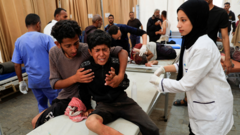*Tehran's citizens are grappling with the aftermath of Israel's military actions, illustrating a complex tapestry of emotions ranging from fear to anger, as the region navigates an escalating crisis.*
**Iranians Experience Fear and Confusion Amid Ongoing Conflict with Israel**

**Iranians Experience Fear and Confusion Amid Ongoing Conflict with Israel**
*Tehran residents express their distress over missile strikes and uncertainty in their daily lives.*
In Tehran, the atmosphere is thick with anxiety as citizens face the reality of an unexpected military assault by Israel which commenced early Friday morning. Long lines form at petrol stations, shops, and roads as residents attempt to flee the capital. A 21-year-old music student, who chose to remain anonymous, expressed her deep sense of unease. “We haven’t slept for nights,” she remarked on an encrypted social media platform. Despite the chaos, she remains unwilling to leave her home, believing it is more honorable to stay and face the danger. “I really don’t want my beautiful Tehran to turn into Gaza,” she adds.
The escalating conflict has left Iranian citizens with conflicting emotions as they navigate life during war. One young woman described her initial excitement at seeing Israeli strikes target powerful military personnel, only to feel deep sorrow upon learning of civilian casualties. The increase in violence has altered daily life, with families starting to prepare for the unthinkable amidst reports of over 220 people killed in Iran, including women and children.
Unlike Israel, where citizens receive alerts and have safe shelters, Tehraners are left vulnerable. Missiles rain down with little warning, and reports of targeted car bombs multiply the fear. "Tehran is a big city, yet every neighborhood feels the pain," one resident noted, as people cling to hope by constantly checking the news to ensure loved ones are safe.
Additionally, the Iranian government's calls to seek refuge in mosques and public transport have been met with skepticism, as the unpredictability of attacks leaves many questioning their safety. Even those who typically align with the regime find themselves grappling with frustration over its perceived failures.
Amidst this turmoil, the perspectives of Iranians are becoming increasingly polarized. While some may celebrate Israel's actions, others express outrage at the implications for civilian life. As tensions escalate, citizens feel caught between their dissatisfaction with the regime and the destructive impacts of foreign military intervention. A young woman likened the atmosphere to the chaos following a maritime disaster, where reactions range from panic to disbelief.
In conversation with BBC Persian, one individual underscored the sense of shared anxiety that many now face, stating “everyone’s life, whether they supported the attacks or not, has changed forever.” As families stockpile essentials in anticipation of worsening conditions, there remains a collective hope that Iran will not suffer the same fate as countries like Iraq or Syria.
Amid the suffering, those in the Iranian diaspora reflect on their duality of emotions, mourning both the loss of civilian life and the removal of regime figures responsible for human rights abuses. Activist Dorreh Khatibi-Hill noted the difficulty in portraying the current situation, emphasizing the shared desire for peace among the populace, irrespective of political affiliations. “None of us wants this war, we don’t want the regime either,” she emphasized, echoing a sentiment common among many Iranians today.
The escalating conflict has left Iranian citizens with conflicting emotions as they navigate life during war. One young woman described her initial excitement at seeing Israeli strikes target powerful military personnel, only to feel deep sorrow upon learning of civilian casualties. The increase in violence has altered daily life, with families starting to prepare for the unthinkable amidst reports of over 220 people killed in Iran, including women and children.
Unlike Israel, where citizens receive alerts and have safe shelters, Tehraners are left vulnerable. Missiles rain down with little warning, and reports of targeted car bombs multiply the fear. "Tehran is a big city, yet every neighborhood feels the pain," one resident noted, as people cling to hope by constantly checking the news to ensure loved ones are safe.
Additionally, the Iranian government's calls to seek refuge in mosques and public transport have been met with skepticism, as the unpredictability of attacks leaves many questioning their safety. Even those who typically align with the regime find themselves grappling with frustration over its perceived failures.
Amidst this turmoil, the perspectives of Iranians are becoming increasingly polarized. While some may celebrate Israel's actions, others express outrage at the implications for civilian life. As tensions escalate, citizens feel caught between their dissatisfaction with the regime and the destructive impacts of foreign military intervention. A young woman likened the atmosphere to the chaos following a maritime disaster, where reactions range from panic to disbelief.
In conversation with BBC Persian, one individual underscored the sense of shared anxiety that many now face, stating “everyone’s life, whether they supported the attacks or not, has changed forever.” As families stockpile essentials in anticipation of worsening conditions, there remains a collective hope that Iran will not suffer the same fate as countries like Iraq or Syria.
Amid the suffering, those in the Iranian diaspora reflect on their duality of emotions, mourning both the loss of civilian life and the removal of regime figures responsible for human rights abuses. Activist Dorreh Khatibi-Hill noted the difficulty in portraying the current situation, emphasizing the shared desire for peace among the populace, irrespective of political affiliations. “None of us wants this war, we don’t want the regime either,” she emphasized, echoing a sentiment common among many Iranians today.






















